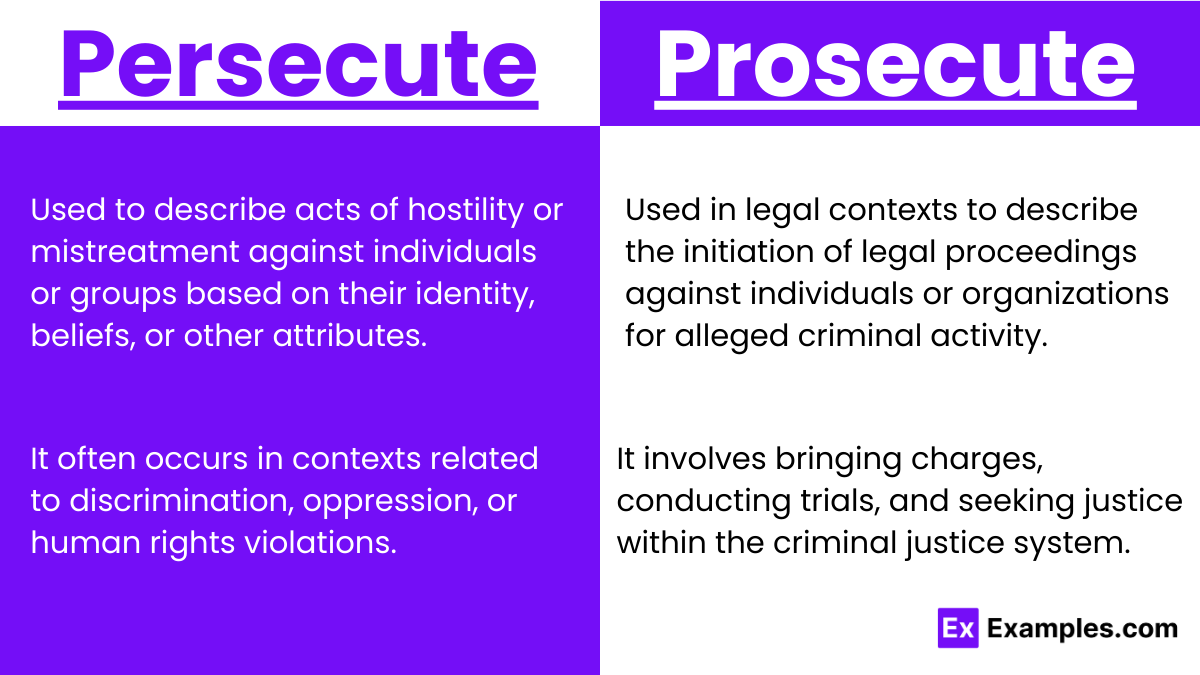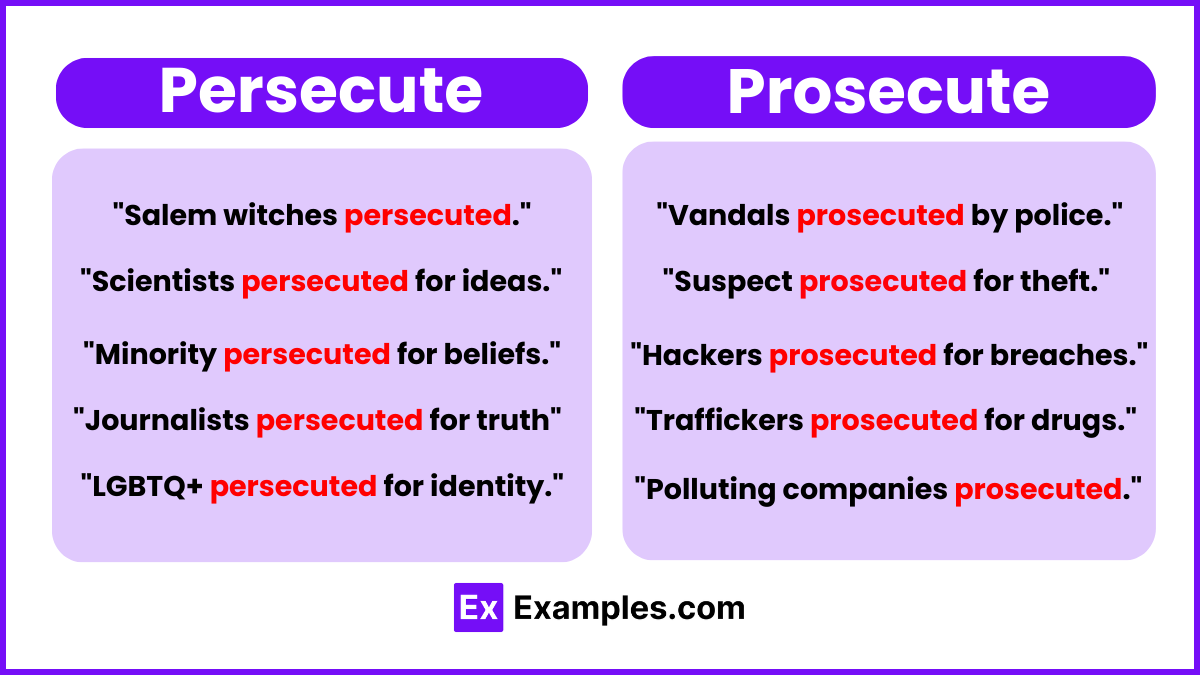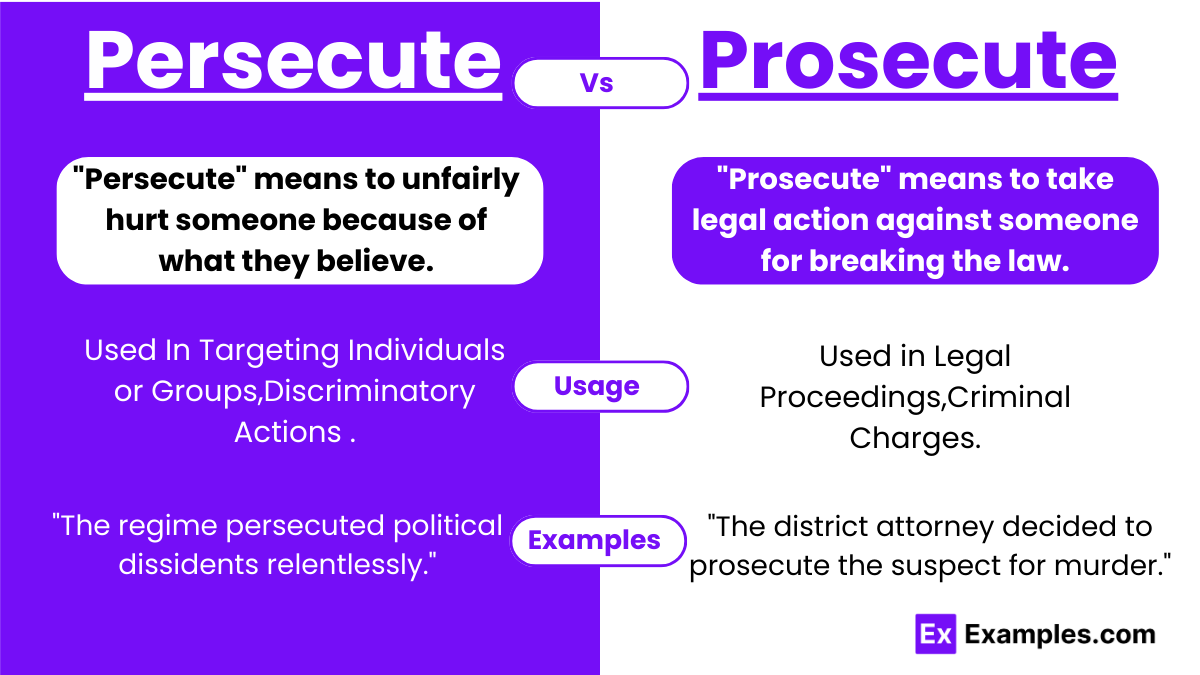Persecute vs Prosecute – Meanings, Differences, Usage, Examples
“Persecute” and “Prosecute” are often confused due to their similar spellings and legal contexts. “Persecute” entails subjecting individuals or groups to ongoing mistreatment, while “Prosecute” involves initiating legal action against someone for breaking the law. While both involve actions against individuals, the former pertains to harassment or discrimination, while the latter focuses on legal proceedings.
Persecute vs Prosecute – Meanings
- Persecute: Itis a verb that refers to the act of subjecting someone to hostility or ill-treatment, typically because of their race, religion, political beliefs, or other aspects of their identity. It involves harassing, oppressing, or mistreating individuals or groups, often in a systematic manner.
- Prosecute: It is also a verb. It refers to the act of initiating legal proceedings against someone, typically in a court of law. Prosecution involves bringing criminal charges or taking legal action against individuals or organizations for violating the law. For instance, a district attorney may prosecute a defendant for committing a crime such as theft or assault.
Summary
How To Pronounce Persecute and Prosecute
- Persecute: Pronounced as \ˈpər-si-ˌkyüt / /ˈpɜrsɪˌkjut/.
- Prosecute: Pronounced as \ˈprä-si-ˌkyüt / /ˈprɑsɪˌkjut/.
Differences Between Persecute and Prosecute
| Aspect | Persecute | Prosecute |
|---|---|---|
| Tone | Carries a negative connotation, implying mistreatment. | Neutral tone, focusing on legal action within the justice system. |
| Authority | Often lacks legal authority, carried out by individuals or groups without legal backing. | Carried out by legal authorities, such as law enforcement agencies or district attorneys. |
| Outcome | Can result in harm without legal consequences for the persecutor. | Aims to establish guilt or innocence through legal procedures, leading to legal consequences for the accused. |
| Motive | Motivated by prejudice, intolerance, or desire for control. | Motivated by upholding the law and seeking justice. |
| Scope | Can occur on personal, societal, or institutional levels. | Focuses on specific individuals accused of violating laws. |
| International Law | May be considered a violation of human rights under international law. | Aligns with legal frameworks at national and international levels. |
| Consequences | Can lead to long-lasting harm and societal divisions. | Aims to resolve legal disputes and maintain social order. |
How To Remember The Differences Between Persecute and Prosecute
Persecute: Think of “persecute” as related to hostility or mistreatment, with the prefix “per–” suggesting a negative action against someone’s identity or beliefs.
Prosecute: Remember “prosecute” by associating it with legal proceedings, with the prefix “pro–” indicating a forward action within the justice system.
Tricks To Remember The Differences Between Persecute and Prosecute
- Visualize the Actions: Picture individuals being persecuted for their beliefs, experiencing hostility or mistreatment. Then imagine legal authorities prosecuting individuals for criminal acts, taking legal action within the court system.
- Associations with the Words: “Persecute” sounds like “persecution” – think of hostility or mistreatment based on identity or beliefs. “Prosecute” sounds like “prosecution” – associate it with legal action and court proceedings.
- Word Origins: Remember that “persecute” relates to hostility or mistreatment, while “prosecute” involves legal action within the justice system.
When to Use Persecute and Prosecute

Usage of Persecute:
- Persecute is used to describe acts of hostility or mistreatment against individuals or groups based on their identity, beliefs, or other attributes.
- It often occurs in contexts related to discrimination, oppression, or human rights violations.
- Persecution can take various forms, including harassment, oppression, or violence.
Usage of Prosecute:
- Prosecute is used in legal contexts to describe the initiation of legal proceedings against individuals or organizations for alleged criminal activity.
- It involves bringing charges, conducting trials, and seeking justice within the criminal justice system.
- Prosecution aims to hold individuals accountable for their actions and maintain law and order in society.
Persecute vs Prosecute – Examples

Persecute Examples
- The witch trials in Salem were infamous for persecuting innocent women.
- He felt persecuted by his coworkers due to his unconventional beliefs.
- The regime persecuted political dissidents relentlessly.
- The minority group was persecuted for their religious beliefs.
- She was persecuted for her gender identity.
Prosecute Examples
- The district attorney decided to prosecute the suspect for murder.
- The company vowed to prosecute anyone found guilty of embezzlement.
- The government is determined to prosecute individuals involved in corruption.
- The police arrested the suspect and prepared to prosecute him in court.
- The attorney general promised to prosecute hate crimes vigorously.
Synonyms For Persecute and Prosecute
| Persecute | Prosecute |
|---|---|
| Harass | Charge |
| Oppress | Bring to trial |
| Victimize | Pursue legal action |
| Intimidate | Indict |
Exercise
Q 1. The government promised to __________ those responsible for the hate crimes.
Q 2. She felt like she was being __________ for her unconventional beliefs.
Q 3. The district attorney decided to __________ the suspect for embezzlement.
Q 4. The religious minority was subjected to __________ by the authoritarian regime.
Q 5. The company decided to __________ the individuals involved in the fraud scheme.
Answer
A 1. prosecute
A 2. persecuted
A 3. prosecute
A 4. persecution
A 5. prosecute
FAQ’S
What Does It Mean to Persecute Someone?
To persecute someone is to subject them to hostility or mistreatment, often due to their identity, beliefs, or other attributes.
What Does Persecuted Mean in Law?
In law, “persecuted” refers to being subjected to hostility or mistreatment based on factors like race, religion, political beliefs, or other identities.
What Are the Three Forms of Persecution?
The three forms of persecution include physical persecution (violence or harm), psychological persecution (intimidation or harassment), and social persecution (ostracism or discrimination).
What Does God Say About Persecution?
God speaks about persecution in various religious texts, teaching resilience, compassion, and the endurance of faith amid adversity.
Which Religion Suffered the Most Persecution?
Historically, many religions have faced persecution. However, Judaism, Christianity, and Islam have experienced significant persecution throughout history, varying by region and era


